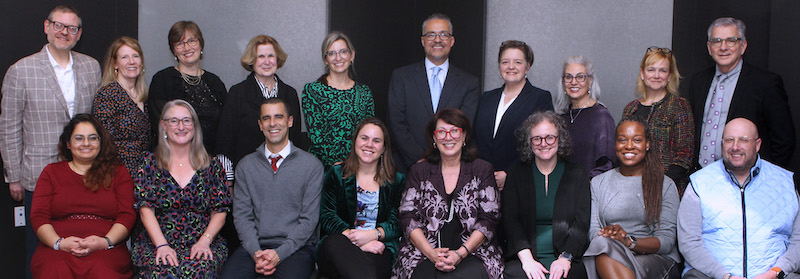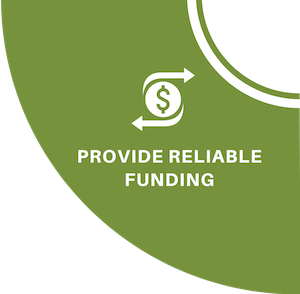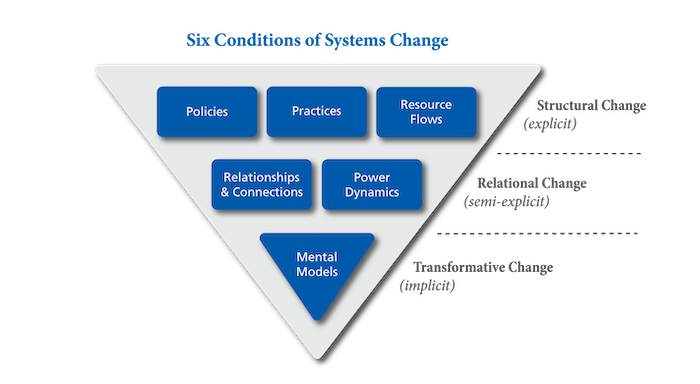Site Search
- resource provided by the Forum Network Knowledgebase.
Search Tip: Search with " " to find exact matches.
Collaboration. Partnership. Alliance. Joint effort. Collective.
Whatever we call it - every one of us has been involved in a collaboration of some kind at some point in our lives. At the same time, both simple and complex, the definition of collaboration – the act of working together with other people or organizations to create or achieve something – means we collaborate nearly every day. To be human is to collaborate.
We’ll explore the constructs of more complex collaborations at the CNJG 2023 Annual Meeting & Holiday Gathering on December 14. Following the pre-meeting workshop, Tools for Funder Collaboration, the business meeting to elect new trustees, and the networking luncheon, the fireside chat, Sustainable, Effective, and Equitable Collaboration – A Conversation that Centers Community, will feature Nidhi Sahni, Partner and Head of US Advisory Group, Bridgespan, and Lucy Vandenberg, Executive Director, the Schumann Fund for New Jersey, to explore what makes a successful collaboration, and how collaboration strengthens the impact of funding initiatives across sectors.
The Annual Meeting is the place where the seeds of collaboration are often first sown. Consider the collaborations you’re involved with now or have engaged in previously – where did those ideas first take shape – possibly in a conversation with another funder that, like you, wanted to have impact on a particular issue, solve an entrenched problem, or explore an untried solution.
Council members collaborate in a number of ways with other funders and nonprofit organizations. As a prelude to the Annual Meeting, on November 16, we’ll learn about the Morris County Funders Group and their Mental Health First Aid collaborative partnership. This first initiative of the funders group aims to address the growing mental health crisis in young people and adults.
Over 25 years ago, CNJG began its life as a collaboration – New Jersey foundations gathered together to form a collective to learn together, build relationships, and share resources. We have several resources to inform your collaborative journey as part of the Annual Meeting resource tab.
One of our core activities has always been to share resources. As we witness the conflict and heartbreaking devastation and sadness in Israel and Gaza following the October 7 attacks, some key resources to inform your work are available through the Center for Disaster Philanthropy, the go-to resource for disaster-related giving, and the Council on Foundations. You can connect quickly with your CNJG colleagues to share additional resources via our 25 listserves, including the Disaster Response Funders listserve. Contact Director of Member Services Craig Weinrich to join listserves that interest you.
Another joint effort highlighting what happens when funders come together, this time to share their own data, is the 2023 New Jersey Philanthropy Benefits & Salary Summary Report. Thank you to CNJG members that completed the surveys to inform this report.
As part of your registration for the Annual Meeting & Holiday Gathering, you’re asked if you have or are participating in a collaboration. I think it’s safe to say the answer is “YES!” for everyone. Maybe the question we should ask as we speed toward 2024, is where are the additional opportunities for collaborations? How can I build on past or current collaborations? Who else should I invite in?
I’m looking forward to seeing you at the Annual Meeting & Holiday Gathering to further explore these ideas and questions.
Thank you to our Annual Meeting sponsors, Prudential, Victoria Foundation, Robert Wood Johnson Foundation, Devils Youth Foundation, Horizon Blue Cross Blue Shield of New Jersey and the Princeton Area Community Foundation. There’s still time – I hope you will consider sponsorship for this special event – our annual “meeting of members.”
In Partnership,
Theresa Jacks, President and CEO
Council of New Jersey Grantmakers
The CNJG board is comprised of 20 leaders who come from CNJG member organizations and are elected by the CNJG membership. Each board member provides guidance and leadership to CNJG by serving up to two 3-year terms.
Photo taken after CNJG Annual Meeting on December 11, 2024.
Back Row: Andy Fraizer, Christine Healey, Lucy Vandenberg, Patricia Hartpence, Aaron Turner, Craig Drinkard, Catherine Wilson, Margarethe Laurenzi, Tammy Rice Herman, and Paul DiLorenzo
Front Row: Priti Mehta, Melissa Litwin, Justin Kiczek, Kate Barrett, Theresa Jacks (CNJG), Marcy Felsenfeld, Jasmyne Beckford, and Jeremy Grunin
Not Pictured: Kortney Swanson Davis, Maisha Simmons, and Maria Spina.
CNJG Board Members
Craig Drinkard, Chair, Victoria Foundation
Justin Kiczek, 1st Vice Chair, F. M. Kirby Foundation
Christine Healey, 2nd Vice Chair, The Healey Education Foundation, Inc.
Catherine Wilson, Treasurer, United Way of Greater Newark
Kortney Swanson Davis, Secretary, Forman S. Acton Educational Foundation
Kate Barrett, The Campbell’s Foundation
Jasmyne Beckford, The Prudential Foundation
Paul DiLorenzo, Salem Health and Wellness Foundation
Marcy Felsenfeld, The Healthcare Foundation of New Jersey
Andy Fraizer, Community Foundation of South Jersey
Jeremy Grunin, Grunin Foundation
Patricia Hartpence, NJM Insurance Group
Tammy Rice Herman, New Jersey State Council on the Arts
Margarethe Laurenzi, Maher Charitable Foundation
Melissa Litwin, The Henry and Marilyn Taub Foundation
Priti Mehta, Investors Foundation
Maisha Simmons, Robert Wood Johnson Foundation
Maria Spina, PSEG Foundation
Aaron Turner, Community Foundation of New Jersey
Lucy Vandenberg, Schumann Fund for New Jersey
Theresa Jacks, President & CEO, Council of New Jersey Grantmakers – ex officio
The Board of Trustees are supported by the work of 8 different committees.
Multi-year Grants
Affirmation: Multi-year funds provided both reliability and breathing room for nonprofits.
Making fundamental and long-lasting change comes with the promise of reliable investments. Longer grant terms create an environment where collaborative partnerships can flourish, and trust and transparency break down power dynamics. The result is that nonprofits have the “breathing room” and financial stability to focus activities where they are most needed.
Although many funders award grants to the same nonprofits year after year, they often require submission of annual applications that request information they already have and are complex and needlessly lengthy. These processes can heighten mutual distrust. From a practical standpoint, multi-year awards reduce paperwork for both funder and nonprofit and open communication channels promoting shared goals, mutual trust, and increased overall impact.
Activities
• For funders that historically award repeat annual grants to the same nonprofit partners, shift from an annual grant/proposal cycle to a long-term, multi-year commitment with an annual outcomes/progress report in lieu of a full application.
• Tailor grant terms to suit grantee timelines and needs (negotiated outcomes and milestones).
• If data collection is required solely to meet a funder’s compliance requirements, the funder should assume this responsibility or provide sufficient funding and/or capacity for the nonprofit to meet the requirement.
Short-term Outcomes
• The number of funders making multi-year grants increases by 50% over the previous years.
Long-term Outcomes
• More funders convert an annual application process for repeat grantee partners to a multi-year commitment with an annual outcomes report at the most, instead of full proposals each year.
• Funders assume responsibility for data collection or provide sufficient funding and/or capacity for the nonprofit to meet the requirement.
• Grant terms are suited to grantee timelines and needs (negotiated outcomes and milestones).
How to Begin Doing Good Better on Reliability
Learning opportunities
• What barriers keep funders from making long-term commitments to repeat grantee partners? Are any of these barriers legal?
• What are the minimum data requirements for funders to collect from repeat grantee partners?
Pre-Work
• Address the barriers to awarding multi-year grants through tested tools.
• Learn about how multi-year grants strengthen grantee partners and improve philanthropic, nonprofit, and community impact.
• Research mechanisms funders can use to meet legal compliance requirements while gaining trust in their grantee partners.
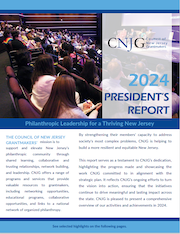
CNJG's President's Reports
Shifting Narratives to Change Systems
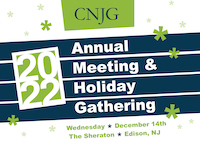 Wednesday, December 14, 11:00 am – 3:00 pm
Wednesday, December 14, 11:00 am – 3:00 pm
Luncheon & Keynote Presentation
Location: The Sheraton, Edison, 125 Raritan Center Parkway, Edison, NJ 08837
Friday, December 16, 11:00 – 12:15 pm
Virtual Workshop via Zoom
The Council of New Jersey Grantmakers thanks everyone who attended our 2022 Annual Meeting & Holiday Luncheon and the Virtual Workshop! We were delighted to see so many familiar faces, and meet many new staff and trustees of our members.
At the business meeting, members elected the new class of trustees, and heard reports about the state of the organization. After lunch and time to reconnect with each other, we heard from our keynote, Bridgit Antoinette Evans, who explained the narrative ocean in which philanthropy swims, and gave examples of how Pop Culture Collaborative is funding organizations to reframe their narratives in which they operate.
During the virtual workshop, members learned about the changemaker experience, how it affects the relationships between funders and their nonprofit partners and even grantseekers. Attendees were led through an exercise to create a journey map, and think through strategies how to examine the experiences that nonprofits have with their organizations.
CNJG members can view recordings and additional resources from the event on the resources tab, when logged in.
Philanthropic Collaboratives:
Driving Impact and Opportunity
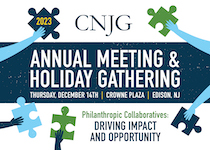 Thursday, December 14, 2023 - 9:00am to 3:00pm
Thursday, December 14, 2023 - 9:00am to 3:00pm
Luncheon, Keynote Presentation & Workshop
Location: Crowne Plaza Edison, 2055 Lincoln Highway, Edison, NJ 08817
The Council of New Jersey Grantmakers thanks everyone who attended our 2023 Annual Meeting & Holiday Luncheon and the Pre-Meeting Workshop that explored Philanthropic Collaboratives: Driving Impact and Opportunity. We were thrilled to reconnect with friends and colleagues and meet new members.
At the Business meeting, the membership elected the new class of Trustees. We also honored our outgoing Board Chair, Jeff Vega, for all the incredible work he accomplished during his term. After lunch and networking time, we listened attentively to Nidhi Sahni, Partner and Head of US Advisory Group, New York, Bridgespan, and Lucy Vandenberg, Executive Director of the Schumann Fund for New Jersey in conversation about the nuances and benefits of collaboration.
At the pre-meeting workshop, Tools for Funder Collaboration, presented by John Harper, Chirlie Felix, and Waheera Mardah of FSG, members were presented multiple models of collaboration and examples of collective impact followed by an opportunity to engage in dynamic discussion to further explore the concepts.
CNJG members can view the FSG PowerPoint and additional resources from the event on the resources tab, when logged in.

There is a plurality of definitions of the term systems change, each contextualized within different cultures and purposes. Doing Good Better embraces systems change as an inter-sector process that addresses complex social problems nonprofits and funders confront with collective action centered on equity, mutual respect, and resilience. Systems change refers to changing the parts and their relationships within a system with the understanding that this change will have ripple effects. As grantmakers, we need to create an environment that enables grantee effectiveness, so they can deliver on their mission. Systems change in philanthropy focuses on structures, policies and processes, resources, values, power, mindsets and, infrastructure that is illustrated in three iterative phases. In time, we hope that the application of this model will result in collective impact and a more resilient social sector for all of New Jersey.
The first phase is structural (operational) change, which involves funders adopting new policies, practices, and resource flows. The second phase is characterized by new relationships and connections that emerge from structural change eschewing old power dynamic practices. Finally, the third phase is transformative change, which occurs when change becomes rooted in organizational culture and mores. We cannot underestimate the length of time and learning at each stage. Achieving transformative change can be a long journey, but it is a learning journey. One grantmaker stated, “One change led to another and another, like dominos. I started to see what people meant by systemic change. New energy and excitement surged among us as hope grew and the cloudy vision of what we wanted became clearer and clearer.”
Although the figure below displays the six developmental stages as linear and distinct, change is unlikely to follow a linear path. Any change in a system will seldom stay fixed at one of these stages but rather will shift back and forth from one stage to another on the path toward the ideal state. We believe just one organization can’t shift the conditions that hold problems in place; we all must share the same perspectives and move the sector together and simultaneously. We call for all of those involved in the sector to work together to build a better and more equitable nonprofit and philanthropy system for all New Jerseyans.
Graphic comes from “The Water of Systems Change” by John Kania, Mark Kramer, and Peter Senge.
Doing Good Better, a partnership of the Council of New Jersey Grantmakers and the New Jersey Center for Nonprofits, is a community of funders and nonprofits taking action against the power imbalances and racial inequities in philanthropy, nonprofits, and government.
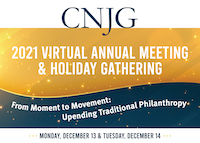
From Moment to Movement: Upending Traditional Philanthropy
Dates & Time:
Monday, December 13 - 2:00 to 3:30 pm -- Annual Meeting Workshop
Tuesday, December 14 - 12:30 to 2:00 pm -- Business Meeting & Keynote Presentation
The Council of New Jersey Grantmakers thanks everyone who attended our 2021 Virtual Annual Meeting & Holiday Gathering.
The 2021 Annual Meeting, From Moment to Movement: Upending Traditional Philanthropy, tackled how we can implement practices based in trust, confront uneven power structures, and advance equity in the philanthropic sector.
Our Annual Meeting Workshop on December 13 explored how two foundations, The Claneil Foundation and Weingart Foundation, are using general operating support, multi-year funding, and transparent communication and feedback to build strong, effective relationships with nonprofit partners. Afterwards, funders discussed where they want to move the needle in their own organization, and the major barriers to implementing those changes.
On Day 2, we heard an inspiring keynote presentation from Marcus Walton, President and CEO of Grantmakers for Effective Organizations (GEO). Marcus kicked off the keynote by sharing critical insights for building trust within and outside your organization. He then engaged in a candid conversation with CNJG President and CEO Maria Vizcarrondo, and answered questions from attendees, on how to reach communities, rethink traditional grantmaking practices, and advance racial equity within philanthropy and New Jersey.
Philanthropy needs to change to meet this moment. Breaking away from ingrained structures and replacing outdated “best practices” with strategies based in trust and power sharing is a long and challenging road for many grantmaking organizations. There will be growing pains. But, during this year’s Annual Meeting & Holiday Gathering, we heard about effective strategies from courageous leaders that have made these changes possible. Join us in 2022 as we continue to rework, reimagine, and operationalize new practices that better serve our partners and communities.
CNJG members can view recordings from the event and additional resources when logged in.
"Co-Creation" is a case study about the Connecticut Early Childhood Funder Collaborative, a project of the Connecticut Council for Philanthropy. The case study, written by Patricia Bowie, examines co-creation, an emerging systems change collaboration model which grew out of a funder-and-state partnership. This unique partnership led to the creation by executive order of a new and independent Office of Early Childhood, which was formally approved by the Connecticut State Legislature in 2013. The companion piece, "Taking on New Roles to Address 21st Century Problems," looks at co-creation from the perspective of a regional association of grantmakers.
The Connecticut Early Childhood Funder Collaborative comprises 14 funders from around the state who bring many years of experience in supporting and operating programs that serve the needs of children and families.
Igniting Equitable Systems Change Together
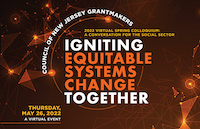
Date: Thursday, May 26
Time: 1:00 to 5:00 p.m.
On May 26, the Council brought together recognized thought leaders from philanthropy and nonprofits for a conversation exploring how the social sector can advance systems change.
Grantmakers and nonprofits grapple with complex, structural issues every day, and take on the difficult questions to move our collective work forward.
During a dynamic discussion, panelists shared strategies to empower proximate leaders, remove structural barriers and build the capacity of grassroots organizations, and shift mental models to challenge assumptions and strengthen nonprofit-funder relationships. After the panel, case study presenters highlighted three local examples of systems change, emphasizing the importance of cross-sector collaboration, collective action, and community engagement. Then, attendees gathered together for small group discussions to unpack key takeaways and discuss their own successes and challenges with systems change.
One of the most highly regarded convenings for social sector leaders in the state, the 2022 Virtual Spring Colloquium considered the power and cultural shifts needed to advance systems change through philanthropic and nonprofit partnership.
Attendees can revisit Whova to access event features such as session recordings, exhibitor virtual booths and sponsor pages, NJ Poetry Out Loud performances, and more.
| Agenda | |
| 1:00 - 1:30 pm: | Opening Session Featuring Sponsors & Exhibitors |
| 1:30 - 2:00 pm: | Break & Independently Visit with Sponsors & Exhibitor Virtual Booths |
| 2:00 - 3:30 pm: | Panel Discussion & Case Study Presentations - Igniting Equitable Systems Change Together |
| 3:30 - 4:00 pm: | Small Group Discussions |
| 4:00 - 4:15 pm: | Break & Independently Visit with Sponsors & Exhibitor Virtual Booths |
| 4:15 - 5:00 pm: | Networking Reception Featuring NJ Trivia |
New Jersey Organizations and Resources
- American Red Cross – Chapters covering the State of New Jersey
- State of New Jersey Catholic Charities - Diocese of Camden - Diocese of Trenton
- Community Emergency Response Teams provides opportunity for citizen volunteers to be involved in emergency management activities.
- Community Food Bank of New Jersey
- Goodwill NY NJ
- Jersey Cares recruits and engages volunteers in efforts that address community-identified needs.
- NJ 2-1-1 helps people find solutions to personal needs by informing them of resources in their community.
- NJ Department of Human Services: Disasters & Emergencies - Help & Information
- Pass It Along, an affiliate of the Hands on Network, recruits and engages volunteers.
- The Salvation Army - New Jersey Division
- Volunteer Center of Bergen County, Inc.
- Volunteer Lawyer’s for Justice - Provides legal support to New Jersey residents.
- United Way of Greater Philadelphia and Southern New Jersey
Nationwide Organizations and Resources
- American Institute for Conservation—Collections Emergency Response Team (AIC-CERT)
Offers free emergency response assistance to cultural organizations with collections. AIC-CERT is supported and managed by the Foundation of the American Institute for Conservation (FAIC) and consists of a force of 107 “rapid responders” trained to assess damage and initiate salvage of cultural collections after a disaster has occurred. - American Red Cross - Disaster Recovery Guides
- BBB Wise Giving Alliance
The BBB Wise Giving Alliance helps donors make informed giving decisions and advances high standards of conduct among organizations that solicit contributions from the public. - Center for Disaster Philanthropy
The when, where, and how of informed disaster giving - Center for International Disaster Information (CIDI)
Provides individuals, groups, embassies and corporations with information and guidance in support of appropriate international disaster relief efforts. - CERF+ Artists’ Relief Exchange along with its partners in the National Coalition for Arts Preparedness and Emergency Response are committed to providing and connected people to emergency relief.
- FEMA
Information from the Federal Emergency Management Agency - FEMA Geo Portal
This portal provides geospatial data and analytics in support of emergency management - FEMA - National Disaster Recovery Framework
This guide provides a flexible structure that enables disaster recovery managers to operate in a unified and collaborative manner to provide effective recovery support to disaster-impacted jurisdictions. - Guide to Navigating FEMA and SBA Disaster Aid for Cultural Institutions
- The Tsunami Learning Project: Lessons for Grantmakers in Natural Disaster Response
This guide, published by Grantmakers Without Borders, offers new tools for grantmakers when responding to natural disasters. - IRS Disaster Relief Resources for Charities and Contributors
In the aftermath of a disaster or in other emergency hardship situations, individuals, employers and corporations often are interested in providing assistance to victims through a charitable organization. The IRS provides a number of resources to help those involved in providing disaster relief through charities. - Disaster Relief, Providing Assistance Through Charitable Organizations
IRS Publication 3833 describes how members of the public can use charitable organizations to provide assistance to victims of disasters or other emergency hardship situations. - Emergency Drying Procedures for Water Damaged Collections
A guide from the Library of Congress - Preparation & Response for Cultural Institutions
A guide from the National Trust for Historical Preservation. - Small Business Administration
Learn about and apply for SBA Disaster Loans for business of all sizes – private and nonprofit
The Council of New Jersey Grantmakers’ 2023 – 2027 Strategic Plan reimagines the future for CNJG. As a result of the extensive strategy development process, the plan includes a renewed vision, mission, core values, and goals. The work is informed by previous efforts, and current issues and trends impacting philanthropy and society.
The 2023 - 2027 Strategic Plan is a roadmap for the next five years, built upon CNJG's past strategic plans and learnings. We look forward to executing this plan, the additional learnings and opportunities it will bring, and delivering on these goals to move us into the future.

Retributing Power by Simplifying and Streamlining Processes
Sisters of St. Joseph Health & Wellness Foundation
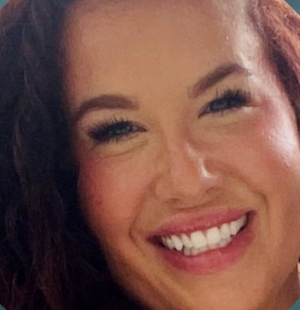 When Beth Collins joined the Sisters of St. Joseph Health and Wellness Foundation as the new Executive Director, she knew that the foundation could be doing more to support its nonprofit ecosystem. With a background in direct service, Beth remembered when she was on the other side of the funding relationship – sometimes spending hours writing lengthy application materials or digging up data to meet reporting requirements, all while juggling her never-ending to-do list. By aligning the values of Trust-Based Philanthropy to the virtues and mission of the Sisters of St. Joseph, she has catalyzed a shift toward redistributing power in its community partnerships.
When Beth Collins joined the Sisters of St. Joseph Health and Wellness Foundation as the new Executive Director, she knew that the foundation could be doing more to support its nonprofit ecosystem. With a background in direct service, Beth remembered when she was on the other side of the funding relationship – sometimes spending hours writing lengthy application materials or digging up data to meet reporting requirements, all while juggling her never-ending to-do list. By aligning the values of Trust-Based Philanthropy to the virtues and mission of the Sisters of St. Joseph, she has catalyzed a shift toward redistributing power in its community partnerships.
This power shift began when Beth started a conversation about values with the foundation board. By approaching the board with curiosity and bringing the voice of the community into the conversation, she set the tone for trust, openness, and an ongoing dialogue. The Foundation is now working toward fully embodying its values in its practices. The Sisters of St. Joseph have expanded their general operating support portfolio, shifted the bulk of the application process from applicants to the Foundation, replaced written reports with honest conversations, and created more opportunities for the public to provide feedback and engage in candid dialogue with the board. Focusing on only the essential information for applications and reporting has enabled staff to redirect their time and energy to develop wholehearted relationships with community partners. By starting with the why, Beth is leading the Foundation toward a clear vision for the how: “Trust Based Philanthropy is about humility – at Sisters of St. Joseph, we recognize that we are just one piece of the puzzle – and we are encouraging others to think outside of themselves.”
Offering Support Beyond the Check
Liberty Hill Foundation
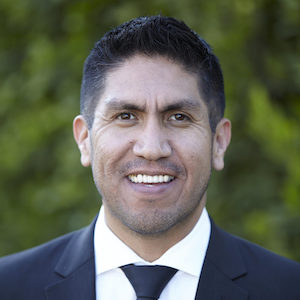 A community-funded foundation since day 1, Trust Based Philanthropy is at the core of the Liberty Hill Foundation. Centered on social justice campaigns, research, and policy initiatives designed to drive systemic change, Liberty Hill Foundation refers to itself as a "Laboratory for Social Change Philanthropy”. When Julio Marcial stepped into the role of Senior Vice President of Programs, he looked beyond the funding and considered the myriad of ways the foundation can support community partners beyond the check by connecting them to other funders and donors. As a member of several pooled funds in Los Angeles, Liberty Hill Foundation proactively seeks opportunities that will benefit their community partners. The Foundation has introduced many funders in their circle to Trust Based Philanthropy principles – this has sparked several conversations at other foundations serving Los Angeles county, several of which have since shifted their practices. Beyond private and public foundations, Marcial advocates for a push to Trust Based Philanthropy in California state funding agencies.
A community-funded foundation since day 1, Trust Based Philanthropy is at the core of the Liberty Hill Foundation. Centered on social justice campaigns, research, and policy initiatives designed to drive systemic change, Liberty Hill Foundation refers to itself as a "Laboratory for Social Change Philanthropy”. When Julio Marcial stepped into the role of Senior Vice President of Programs, he looked beyond the funding and considered the myriad of ways the foundation can support community partners beyond the check by connecting them to other funders and donors. As a member of several pooled funds in Los Angeles, Liberty Hill Foundation proactively seeks opportunities that will benefit their community partners. The Foundation has introduced many funders in their circle to Trust Based Philanthropy principles – this has sparked several conversations at other foundations serving Los Angeles county, several of which have since shifted their practices. Beyond private and public foundations, Marcial advocates for a push to Trust Based Philanthropy in California state funding agencies.
The Liberty Hill Foundation embraces itself as a fundraiser for its nonprofit partners and its responsibility for the Los Angeles community. The Foundation raises the funds and opens doors for nonprofits and then “steps out of the way,” says Julio. According to Julio, partnerships are the key to maximizing trust and impact in the community: “We can't do this without our partners, peers, and donors. We need to call each other out – and to call each other in.”
Leading with Trust, Transparency, and Responsiveness
Headwaters Foundation
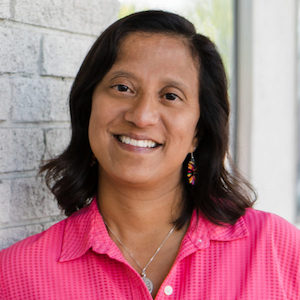 Headwaters Foundation is a health-conversion foundation working side by side with the community to achieve better outcomes towards a healthy and thriving Western Montana. Brenda Solorzano, CEO of Headwaters, has been at the helm of the foundation since its inception in 2017. With over 20 years of experience in traditional philanthropy, Brenda began asking big questions about standard philanthropic practices. Brenda is especially focused on tapping into the collective knowledge and experience of the community to create impactful systems. Early on in her tenure as CEO, Brenda shared her vision for Trust Based Philanthropy with the foundation’s board and they have supported her as she’s stewarded the foundation through its strategic planning process.
Headwaters Foundation is a health-conversion foundation working side by side with the community to achieve better outcomes towards a healthy and thriving Western Montana. Brenda Solorzano, CEO of Headwaters, has been at the helm of the foundation since its inception in 2017. With over 20 years of experience in traditional philanthropy, Brenda began asking big questions about standard philanthropic practices. Brenda is especially focused on tapping into the collective knowledge and experience of the community to create impactful systems. Early on in her tenure as CEO, Brenda shared her vision for Trust Based Philanthropy with the foundation’s board and they have supported her as she’s stewarded the foundation through its strategic planning process.
Community input and feedback was important to Brenda. With the board’s support, she took this a step further by engaging the community as co-creators and decision-makers. To accomplish this, Brenda invited 600 nonprofit representatives across the state to the table to share their thoughts. Brenda asked each person 2 questions: “If you were in my seat, what do you think the foundation should prioritize?” and “What’s the biggest challenge in your work?” By creating a space for open dialogue, Brenda took the pulse of the real challenges in Western Montana communities.
Soon after her introduction to Western Montana’s nonprofit sector, Brenda called on the community again to help design the foundation’s strategic focus. She hosted a series of public community meetings in each of Montana’s 15 counties. Headwaters facilitated a design-thinking process for members to discuss their challenges and co-create solutions. Two key strategies emerged: upstream systems and social change determinants prioritizing children and Indigenous populations.
Brenda engaged the community as decision-makers as Headwaters explored partner organizations for the foundation’s child thriving portfolio. The community nominated and voted on non-profit partners in a live meeting. This was a new approach and even some staff were nervous about the outcome. Headwaters proudly reports that a few years later, many of the organizations selected have grown to become blossoming collaborations. Grounded in Trust-Based principles since its inception, Headwaters is an exemplar of what it means to Do Good Better. Brenda says, “Trust Based Philanthropy is about starting from a place of trust.”
Co-Creating Goals by Soliciting and Acting on Feedback
T. Rowe Price Foundation
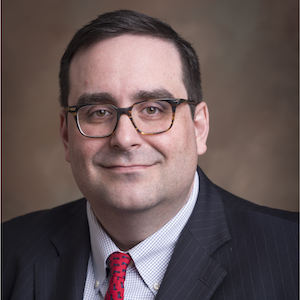 When John Brothers joined T. Rowe Price Foundation as President in 2015, the Foundation’s home in Baltimore was in the midst of social unrest following the tragic murder of Freddie Gray, a 25-year old Black man arrested over his legal possession of a knife and sustained injuries while being transported by the Baltimore Police. The T. Rowe Price Foundation recognized that it was a critical time to pause and listen to the Baltimore community. Within months of joining the Foundation, John Brothers and the Foundation team began an ongoing dialogue within Baltimore – in homes, places of worship, and community spaces. By leaning into the expertise and experience of community partners, John developed the T. Rowe Price’s Theory of Philanthropy, which mirrors principles to those similar to Trust-Based Philanthropy.
When John Brothers joined T. Rowe Price Foundation as President in 2015, the Foundation’s home in Baltimore was in the midst of social unrest following the tragic murder of Freddie Gray, a 25-year old Black man arrested over his legal possession of a knife and sustained injuries while being transported by the Baltimore Police. The T. Rowe Price Foundation recognized that it was a critical time to pause and listen to the Baltimore community. Within months of joining the Foundation, John Brothers and the Foundation team began an ongoing dialogue within Baltimore – in homes, places of worship, and community spaces. By leaning into the expertise and experience of community partners, John developed the T. Rowe Price’s Theory of Philanthropy, which mirrors principles to those similar to Trust-Based Philanthropy.
T. Rowe Price’s Theory of Philanthropy centers long-term impact by strategic investments in areas identified in partnership by those who live and work within the Baltimore community. The Foundation and community partners co-define a vision for success and community partners are trusted with the agency to make decisions in pursuit of shared goals. T. Rowe Price’s Theory of Philanthropy is considered a distinct model among other large corporate foundations. When asked how John managed to gain board consensus on this novel approach, he characterized the Theory of Philanthropy with a business metaphor: “People don’t buy stocks for an iPhone – they invest in Apple.” The Foundation focuses on supporting nonprofit organizations in a holistic way. By listening to the community early on, John shifted the Foundation’s approach from funding a variety of important, yet disconnected, programs to a co-creating strategic investment of capital and other support on more focused efforts that will have a lasting impact. To learn more please visit troweprice.com/foundation.
Doing Good Better, a partnership of the Council of New Jersey Grantmakers and the New Jersey Center for Nonprofits, is a community of funders and nonprofits taking action against the power imbalances and racial inequities in philanthropy, nonprofits, and government.
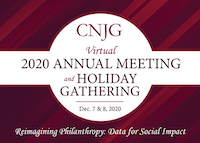
Please Log In to view resources from this event.
Reimagining Philanthropy: Data for Social Impact
Held:
Monday, December 7 - 2:00 to 3:30 pm -- Skill-Building Workshop
Tuesday, December 8 - 12:30 to 2:00 pm -- Business Meeting & Keynote Presentation
Thank you to everyone who attended CNJG’s first ever virtual Annual Meeting & Holiday Gathering. This year’s meeting focused on the many ways philanthropy can use data for social impact.
Data science is a powerful tool to address housing and food insecurity, education inequality, health disparities, civic injustice, and other longstanding social issues that continue to intensify during the pandemic. Building data capacity equips local leaders with information to develop and advocate for more effective policies. New evaluation strategies can outperform outdated processes that reinforce inequities and slow progress. Research and technology that fuels innovation in the private sector can help nonprofit and government organizations drive impact in New Jersey communities..
On Day 1, the Annual Meeting Workshop focused on evaluation and learning practices that center equity and social impact. And on Day 2, Keynote panelists shared how data science can help connect people to services, address racial inequity, and create greater impact in our communities during the pandemic and beyond..
Philanthropy can’t go back to “normal,” because normal wasn’t good enough. During this year’s Virtual 2020 Annual Meeting & Holiday Gathering we explored how we can reimagine philanthropy by harnessing the full power of data for social impact.
The Council of New Jersey Grantmakers would like to thank our sponsors for their generous support: Signature Sponsors – Novartis and PSEG; Sustaining Sponsors – Prudential and Horizon Blue Cross Blue Shield of New Jersey; Collaborating Sponsor – Robert Wood Johnson Foundation; and Performance Sponsor – The Provident Bank Foundation.

